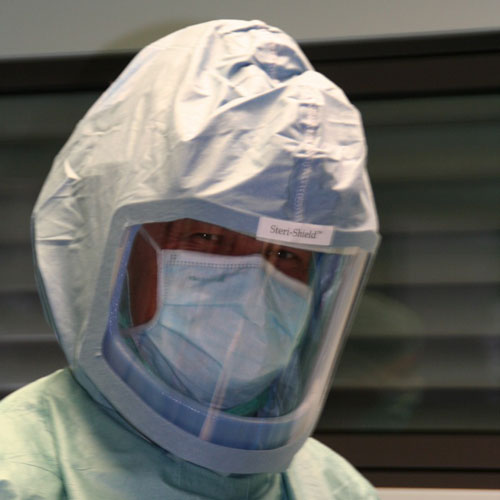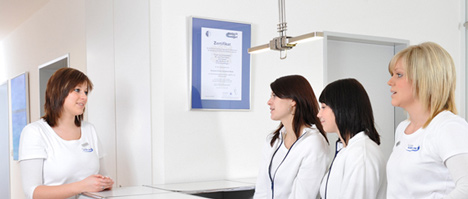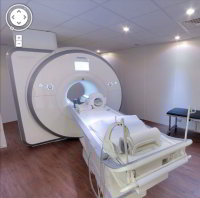Hygiene - Special Requirements for Orthopaedic Surgery
 The wearing of sterile closed air circuit helmet systems prevents germs being spread by the orthopaedic surgeons in the operating room. © Joint-surgeon.com
The wearing of sterile closed air circuit helmet systems prevents germs being spread by the orthopaedic surgeons in the operating room. © Joint-surgeon.com
Successfully preventing infection at the orthopaedic Gelenk Klinik
Infection in orthopaedic and trauma surgery is a particular challenge for the physician. They have to prevent infection from spreading both within and outside the patient's body. The statistical probability (risk) of infection from this type of surgery depends on the nature and extent of surgery but is in the range of 1-2%. At the orthopaedic Gelenk Klinik the risk is currently 0.5%.
Hygiene is of particular importance when prosthetics and other surgical implants are being used. In many orthopaedic procedures, artificial implants (such as screws and prosthetics) are implanted into bones and joints. As these do not have their own natural immunity (unlike natural bone and tissue), it is essential that they do not become an attractive place for germs already present inside the body to settle. Infection of artificial material in this way is a particular danger for the outcome of orthopaedic surgery.
High level of technical investment and quality control in hygiene standards
Surgery at the Gelenk-Klinik is only performed within the highest, standardized sterile conditions. These processes conform to the DIN ISO9001:2008 standard of quality management.
The disinfection of the operating environment begins with the patient. Just before surgery, the area surrounding the joint to be operated on is made free of body hair by shaving. Immediately before surgery, the skin in that area and the adjacent body parts are cleansed with a special disinfectant, according to a standard procedure. The surgical area of the body is then kept sterile by the use of sealed covers and bacteria-reducing film.
The Gelenk Klinik has installed a type of air filtering system called "laminar airflow". This system creates a continuous flow of air straight from the ceiling into the floor. Airborne germs cannot be transmitted in this environment. "Laminar airflow" is used to minimize infection from airborne germs in the operating room.
Infection control through high quality hygiene standards, experience and routine
Surgeons and theatre staff are only permitted to enter the operating room if they are wearing specially purified OP clothing, headgear and face masks. If joint prostheses are to be implanted, the theatre personnelwill also wear special sterile closed air circuit helmets which also prevent the spread of airborne germs.
Before surgery, prophylactic protection against pathogens is administered to the patient in the form of an antibiotic infusion.
Every person who comes into direct contact with the wound, is required to wash and disinfect their fingers, hands and forearms after surgery, following a standardized procedure.
Hygiene - an essential component of the surgical procedure
Throughout the surgical procedure, wound cleaning is performed at set intervals in order to maintain maximum sterility at all times. Surgery is completed by careful suturing of the wound. Whilst still under sterile conditions, the wound is dressed to ensure that a condition of maximum sterility is maintained for the period following the operation. Before a patient is discharged from the clinic, the wound is inspected and redressed.
Implant patients require special monitoring to avoid risk of infection.
Tooth infection may be a source of bacteria in the body that can easily spread through the bloodstream (blood) to a prosthesis and trigger an infection there. As a result the Gelenk Klinik checks patients´ teeth thoroughly prior to an implant operation and sanitizes the teeth if necessary.
After patients return home following surgery, patients with orthopaedic implants should consult their General Practitioner if they have an infection elsewhere in the body so that the spread of the infection to the prosthesis can be prevented.




